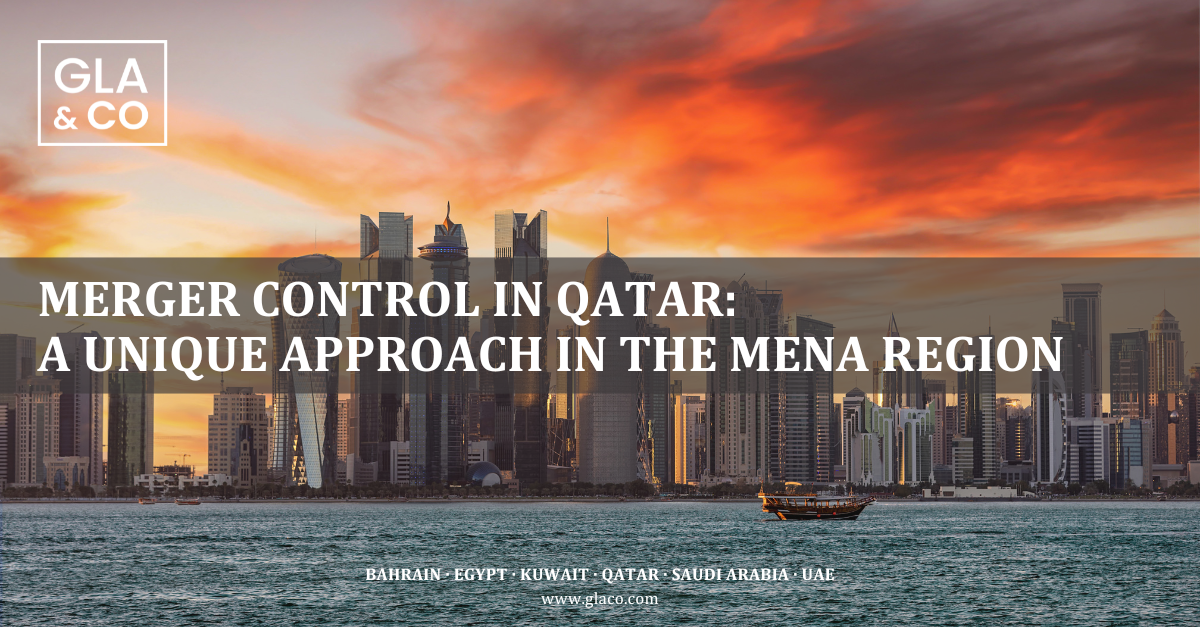
Merger Control in Qatar: A Unique Approach in the MENA region
Overview
Qatar’s competition law regime is unique in the region, especially with respect to merger control. Unlike Saudi Arabia, Kuwait, Egypt and others, the Qatar Competition Law (Law No. 19 of 2006) does not currently include quantitative financial thresholds required to be met to trigger a mandatory merger control filing. Instead, the Qatar competition law regime focuses on qualitative factors—namely the concept of “control” or “domination” of a market—when determining whether parties to an economic concentration must notify the authorities in Qatar and obtain approval to the proposed transaction prior to closing. This qualitative regime necessitates a careful case-by-case analysis for both companies and their legal advisors.
Financial Thresholds
The majority of competition law regimes across the MENA region are aligned with international practices, while a few jurisdictions are still in the process of revamping their competition laws to reflect this regional trend. In addition to anti-competitive behaviors (collusion, price fixing, etc.), many MENA jurisdictions also regulate economic concentrations in a similar manner to more mature jurisdictions. For example, parties to a potential merger or acquisition, or any other economic concentration event (such as a joint venture), will typically be required to obtain clearance from the relevant competition department prior to closing proposed transactions–assuming the relevant jurisdiction’s financial thresholds are met. These financial thresholds typically include:
- The market share of the relevant companies over the relevant market; and/or
- The revenue/turnover of the relevant companies in the jurisdiction
The market share thresholds and turnover thresholds vary from country to country. Kuwait, for example, has low financial thresholds. If any party to an economic concentration transaction has sales exceeding KWD 500,000 (approximately 1.6 million USD), then the parties to the transaction would be required to file a merger control application. On the other hand, in Egypt, the relevant financial thresholds are much higher: a combined turnover or assets of the parties in Egypt exceeding 900 million Egyptian Pounds (approximately 17.8 million USD) OR a combined turnover or assets of all parties worldwide exceeding 7.5 billion Egyptian Pounds (approximately USD 149 million). In Qatar, there are no specific thresholds for either market share or turnover.
“Local Nexus”
The Qatar Competition Law applies to all economic and commercial activities that could impact competition in Qatar. This includes “foreign-to-foreign” transactions involving companies that export their products to Qatar but have no legal presence in the country. In this sense, Qatar has adopted a relatively subjective and expansive “local nexus” test.
Merger Control – filings and approvals
Article 10 of the Qatar Competition Law establishes a mandatory notification requirement for any transaction that results in “control or domination” of the market. The law defines “control or domination” as the ability of an entity to influence prices and product volume in a manner that prevents competitors from effectively challenging its position. Since no financial thresholds are prescribed, in theory every potential transaction considered an economic concentration must be disclosed in advance to the Qatar Competition Protection Department (“CPD”). Failure to do so constitutes a violation under the Competition Law, which can lead to financial sanctions and more.
Unlike other MENA jurisdictions, Qatar does not charge a filing fee for merger control applications. In other jurisdictions, filing fees are calculated based on paid-up capital, assets in the jurisdiction, or annual turnover in the jurisdiction.
Once a notification has been filed, the CPD has ninety (90) days to issue a decision. If no decision is made within this timeframe, the transaction is deemed to be approved.
Penalties
Qatar’s approach to enforcement is distinct from other MENA jurisdictions. While regulators in Kuwait, the UAE and KSA impose direct fines, the CPD does not have independent enforcement powers. Instead, penalties are imposed through the local courts, with fines ranging from QAR 100,000 to QAR 5 million (approximately 1.3 million USD). In addition to monetary penalties, the courts have the authority to confiscate profits resulting from unlawful activities (including non-compliant mergers), an enforcement mechanism not commonly seen in other jurisdictions.
Conclusion
Qatar’s merger control regime differs from its neighbors in several key aspects, such as:
- Absence of a market share-based or turnover-based threshold;
- Expansive “local nexus” test;
- Subjective and broad interpretation of “control or domination” of a relevant market and subsequently expansive assessment of the transactions subject to notification and approval; and
- No filing fees.
2025 and beyond
The existing framework has remained largely unchanged since the issuance of the Qatar Competition Law in 2006. Although many observers expect a new law to be issued, there has been no official announcement to this effect, so local and foreign companies (and their legal advisors) should consider the unique features of the merger control regime in Qatar as well as the potential gun-jumping consequences.
More Information
GLA recently presented a webinar on Merger Control developments across the region, during which our lawyers covered these issues across 5 jurisdictions: Qatar, Kuwait, Saudi Arabia, the UAE and Egypt. A recording of the webinar is available on our YouTube page here: https://youtu.be/dzxpnkVWSNs?si=2UJmKNTcKSQoDeF4
With our exceptional Anti-trust and Competition practice, which has been leading the way in the region, and our great personal relationships with local regulators, GLA provides top-tier legal services by properly assessing transactions under the competition regimes and successfully navigating economic concentration filings with ease.
For more information, please reach out to Asad Ahmad, our Anti-Trust and Competition Head, at asad.ahmad@glaco.com.
Authors: Dean Jaloudi, Partner, Asad Ahmad, Head of Anti-Trust & Competition, and Jehan Saleh, Associate.

